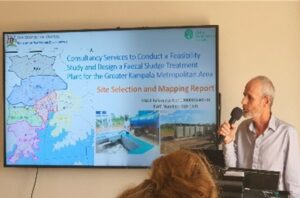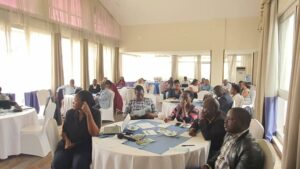Under the leadership of the Ministry of Water and Environment (MWE) and with financial support from KOICA, the “Strengthening Solid Waste and Faecal Sludge Management Capacity for Greater Kampala Metropolitan Area (GKMA)” project has reached a stage in which the steering committee has established and finalized consensus on the site selection for a Faecal Sludge Treatment Plant (FSTP) within the Greater Kampala Metropolitan Area (GKMA).
Coping with issues arising from rapid population growth and unplanned urbanization within the GKMA, it has become a challenge to manage faecal sludge. As a result, this has put pressure on the existing services and infrastructure. This uncontrolled waste disposal has polluted the GKMA’s air, water, and soil, putting both public and environmental health at risk. As a solution, GGGI has contracted and partnered with Fichtner Water & Transportation (FWT), a consultancy firm to support the development of the feasibility studies and design of an FSTP.
On the 11th of October 2022, all stakeholders that are part of the established Steering Committee guiding this development, and unanimously selected Mukono Katikolo for the feasibility and detailed design of the FSTP.

Presentation from Fichtner Water & Transportation
To enable the successful site selection of the FSTP, the following criteria were used:
1) Technical & operational feasibility,
2) Environmental & social accessibility,
3) Financial affordability,
4) Institutional issues,
5). Potential integration with other installations or projects.
Out of the 8 accessed potential FSTP sites (Kikoko, Manja, Ssumbwe, Kira, Mukono– Katikolo, Nansana, Kinawataka, Bugolobi & Kajjansi), based on the criteria two sites (Mukono & Kinawataka) were shortlisted for further consideration, after which participants selected Mukono Katikolo.
Coping with issues arising from rapid population growth and unplanned urbanization within the GKMA, it has become a challenge to manage faecal sludge. As a result, this has put pressure on the existing services and infrastructure. This uncontrolled waste disposal has polluted the GKMA’s air, water, and soil, putting both public and environmental health at risk.
As a next step, and in order to contribute to solving these issues, the MWE and GGGI will support Mukono municipality to develop a sanitation improvement strategy to guide their interventions in addition to the FSTP design. This will help the Municipality to establish an efficient, effective sanitation structure in place and contribute to building a strong, inclusive, and sustainable Uganda.

Participants of the session.
Furthermore, the Project Steering Committee that will be supporting and offering technical direction and guidance for both faecal sludge and solid waste management components was inaugurated. This committee will ensure successful achievements of the project outcomes while building a sustainable Uganda.
The following entities are part of the steering committee: the Ministry of Water and Environment (MWE), Korea International Cooperation Agency (KOICA) and Global Green Growth Institute and other present to support decision-making on this date were: the National Water and Sewage Cooperation (NWSC), Ministry of Kampala Capital City and Metropolitan Affairs (MoKCC&MA), Kampala, Capital City Authority (KCCA), National Planning Authority (NPA), National Environment Management Authority (NEMA), Ministry of Lands, Housing & Urban Development (MoLHUD), Ministry of Energy and Mineral Development (MEMD), Fichtner Water & Transportation (FWT), The Association of Uganda Emptiers Ltd (TAOUEL), Gulpers Association Uganda Ltd, Municipality representatives from Wakiso, Nansana, Mukono and Kira.
The author is Mildred Nakagwe, a Communications Intern with the Global Green Growth Institute Uganda.